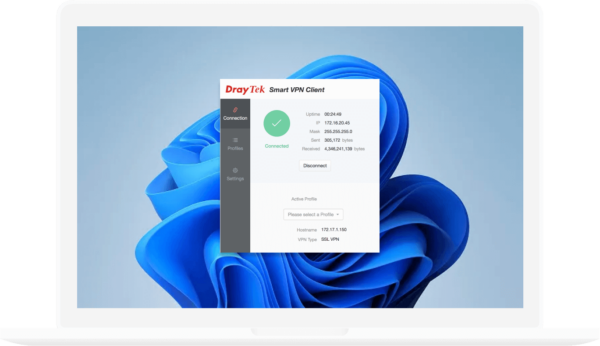Brief Overview of VPN Client
A VPN client is a software application that enables users to connect to a virtual private network (VPN) and access secure, encrypted internet connections. It serves as the intermediary between the user’s device and the VPN server, facilitating the encryption and decryption of data transmitted over the network.
Detailed Exploration of VPN Client
VPN clients offer a range of functionalities beyond basic connection establishment. They often include features such as:
- Encryption Protocols: Support for various encryption protocols such as OpenVPN, IKEv2, and L2TP/IPsec.
- Kill Switch: Automatically terminates internet access if the VPN connection drops, preventing data leaks.
- Split Tunneling: Allows users to route only specific traffic through the VPN while accessing other services directly.
- Multi-Platform Support: Compatibility with a wide range of operating systems and devices, including desktops, laptops, smartphones, and tablets.
- DNS Leak Protection: Prevents DNS requests from bypassing the VPN tunnel and exposing users’ browsing activities.
- Server Selection: Option to choose from multiple VPN server locations for optimized performance and access to geo-restricted content.
Key Features of VPN Client
A comprehensive analysis of the key features of VPN clients reveals their importance in ensuring secure and private internet browsing experiences:
| Feature | Description |
|---|---|
| Encryption | Utilizes advanced encryption algorithms to protect data transmitted over the internet. |
| Anonymity | Masks users’ IP addresses and online activities, enhancing privacy and anonymity online. |
| Security | Safeguards against cyber threats such as hacking, surveillance, and data interception. |
| Accessibility | Enables access to geo-restricted content by spoofing users’ locations. |
| User-Friendly | Offers intuitive interfaces and easy-to-use functionalities for seamless user experiences. |
Types of VPN Client
VPN clients can be categorized based on their deployment and functionality:
- Desktop Clients: Installed on desktop or laptop computers, providing comprehensive VPN functionalities and management options.
- Mobile Clients: Designed for smartphones and tablets, offering on-the-go privacy and security for mobile internet usage.
- Browser Extensions: Lightweight VPN solutions that integrate directly into web browsers, offering selective VPN usage for specific online activities.
- Router Firmware: VPN clients embedded within router firmware, extending VPN protection to all devices connected to the network.
Ways to Use VPN Client
The versatility of VPN clients allows for various applications across different scenarios:
- Enhanced Privacy: Protects sensitive data and online activities from surveillance and tracking by ISPs, governments, and malicious actors.
- Bypassing Censorship: Allows users to circumvent internet censorship and access blocked websites and services in restrictive regions.
- Secure Remote Access: Facilitates secure remote access to corporate networks and resources for remote workers and telecommuters.
- Anonymous Torrenting: Enables anonymous torrenting and P2P file sharing by masking users’ IP addresses and encrypting data transmissions.
Challenges and Solutions with VPN Client Usage
While VPN clients offer numerous benefits, users may encounter certain challenges:
- Performance Impact: VPN encryption can cause a decrease in internet speed due to increased data overhead. Solution: Opt for VPN providers with high-speed servers and optimized protocols.
- Compatibility Issues: Some VPN clients may not be compatible with certain devices or operating systems. Solution: Choose VPN clients with multi-platform support and frequent updates.
- Security Risks: Inadequately configured VPN clients or use of untrustworthy VPN services can pose security risks. Solution: Select reputable VPN providers with robust security measures and transparent privacy policies.
Characteristics and Comparisons
Comparison between VPN clients and similar terms such as proxy servers and Tor networks sheds light on their unique characteristics and functionalities:
| Aspect | VPN Client | Proxy Server | Tor Network |
|---|---|---|---|
| Encryption | Yes | No | Yes |
| Anonymity | High | Low | High |
| Performance | Moderate to High | Moderate | Low |
| Traffic Routing | All Traffic | Selected Traffic | All Traffic |
Future Perspectives and Technologies
Future advancements in VPN technology are expected to focus on:
- Enhanced Security: Integration of blockchain and zero-trust security models to mitigate emerging cyber threats.
- Improved Performance: Implementation of next-generation encryption algorithms and protocol optimizations for faster and more efficient VPN connections.
- IoT Integration: Development of VPN solutions tailored for Internet of Things (IoT) devices to ensure privacy and security in connected environments.
VPN and Its Association with VPN Client
The VPN client serves as the primary interface for users to interact with VPN services, enabling secure and private internet browsing experiences. It plays a crucial role in establishing encrypted connections to VPN servers and safeguarding users’ online activities from surveillance and interception.
Resources for Further Information
Explore the following resources for in-depth insights into VPN clients and related topics:
By leveraging the capabilities of VPN clients, users can navigate the virtual world with confidence, knowing that their online activities remain private and secure. Whether for personal privacy, accessing geo-restricted content, or ensuring secure remote access, VPN clients offer indispensable functionalities for today’s digital landscape.


